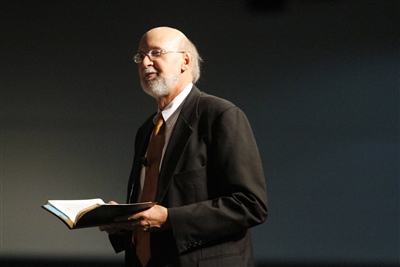Youth Ministry and The Primitive Church - Small Groups
I spent the beginning of last week on the campus of Virginia Wesleyan College. I was on campus for two days to attend a seminar led by Bishop Timothy Whitaker. The title of the lecture was The Future Identity and Mission of the Church. I know what you're thinking. Yes, this is the best way to spend the day after Easter which is supposed to be your day off.
 The two day seminar walked the assembled group of United Methodist clergy (I'm not sure how I got in) through the history of the primitive church, the first 300 years after Christ's resurrection.
The two day seminar walked the assembled group of United Methodist clergy (I'm not sure how I got in) through the history of the primitive church, the first 300 years after Christ's resurrection.
As I've been processing what Bishop Whitaker spoke about I have come to the conclusion that the primitive church has a lot in common with youth ministry. While early Christians did not have to worry about youth group activities to plan or summer mission trips (I mean after all they were in the midst of persecutions with the whole being eaten by lions and stoned to death deal) they were trying to spread a faith in a land where Christianity was unfamiliar and seen as a threat by many. If you have ever stepped foot into a middle or high school you can tell fairly quickly that Christianity is unfamiliar and at times seen as a threat in those environments.
House Churches & Small Groups - The Primitive Church Did Not Meet in Churches
The primitive church met in house churches & small groups to begin. Not because they wanted an intimate connection with one another but because there just weren't a lot of them. In addition, a large group gathering would probably attract too much unwanted attention which could lead to more being eaten by lions. Early Christians did not want to stand out in a crowd that in some cases was hostile towards their newly discovered faith. In some cases it was more about self-preservation than it was about hiding the Gospel.
Middle and high school was a rough time for me. My parents were in the midst of a nasty divorce, we moved three times, and I was a band nerd. Youth group was a place I went for refuge and support. It was a place where I could be myself, talk about all the shit going on at home, and learn that Jesus was right there with me in the middle of it all. With all of the good stuff youth group had to offer, I kept it my dirty little secret. Don't get me wrong, I had church friends who were school friends who were also, in some cases, fellow band geeks (that's you Laura) but other than the handful of close friends who crossed the line between school and youth group I never invited an outsider in.
Youth group was my safe space and I wasn't going to do anything to compromise that. I was afraid of the public shaming, ridicule, or whatever those delinquents at TJHS would throw my way. In hindsight this was silly, but in the moment it was reality for me.
I think teenagers today are dealing with the same thing. The gap between youth group or church and school or the rest of the world is growing by the second. Bishop Whitaker referred to this as Christianity no longer being the religion of the culture. In most middle and high schools (probably more predominantly outside the Bible Belt) this is true. It has been my experience in youth ministry that it would be easier to have students talk about sex with the senior pastor than to invite a "non-church" friend to youth group. Don't worry Tim, the sex talk isn't for a few weeks. You've got time to prepare.
 While churches are figuring out what Christianity will look like in a world where it is no longer the dominant religion of the culture I'm afraid youth ministry is getting left in the dust. All too often in Facebook groups and on youth ministry blogs I see people who are trying to grow ministry based on 1990's attraction style ministry. They get short-term traction with no long-term gain. Students will bring a friend on the night an iPad is being given away but when it's time for Bible study it's just the PK's or kids whose parents made them go.
While churches are figuring out what Christianity will look like in a world where it is no longer the dominant religion of the culture I'm afraid youth ministry is getting left in the dust. All too often in Facebook groups and on youth ministry blogs I see people who are trying to grow ministry based on 1990's attraction style ministry. They get short-term traction with no long-term gain. Students will bring a friend on the night an iPad is being given away but when it's time for Bible study it's just the PK's or kids whose parents made them go.
The early church had an urgency to figure out just what Jesus did which created excitement. Christianity was new and full of mysteries that they would help to figure out.
Maybe youth ministry needs a bit of primitive excitement.
Let's stop spoon-feeding answers to kids and start walking with him.
Let's let them know it's ok to question and doubt and to get pissed off at God every now and then, because if it's not OK to get pissed off at God I've got a lot of explaining to do.
Let's cut the "Jesus is my boyfriend music" and invite some worship with substance in it and allow teenagers to grow in faith even if that growth makes us uncomfortable.
If youth ministry can adapt to a new reality the church faces today, the next generation of church leaders will be able to lead and grow the church tomorrow.
Stay tuned for more reflection on the time I spent with Bishop Whitaker.